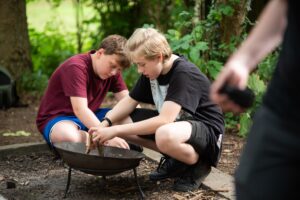This month, we spoke to Georgina Cobb, a teaching assistant and ELSA from Hampshire. She told us about what resources and initiatives have worked really well to support service children in her school, including some of our Little Troopers resources.
Tell us about yourself and how you came to be a teaching assistant?
I started working in schools when my (now teenage) boys were younger. We were living in Germany at the time and it seemed like a good way to work and discover how best to support my own boys with their learning. I completely fell in love with being a teaching assistant and, seven years later I am now doing a teaching degree alongside my teaching assistant role to become a primary teacher. I work in a small village primary school in Hampshire where I am also an Emotional Learning Support Assistant alongside my teaching assistant role.
How many military children are there in your school?
At the moment we have 18 service children who come from a mix of Army and Navy families. We tend to have between 16 and 25 on role at any time. Our total intake is just over 100 children, so it’s quite a high percentage of pupils overall.
How does your school support forces’ families?
We support our service pupils and families by having a weekly club called Base Club. Base Club allows the children to feel part of their own community where they can learn from shared experience and talk openly about achievements and worries. We do all sorts of things like planning the schools Armed Forces Day, crafts and taking part in lots of community projects such as workshops with the Museum of Army Flying at Middle Wallop or games nights with the local Royal British Legion. We also write to our deployed parents and have a family Christmas party every year. We are always busy at Base Club!
Do you have a connection to the military? If so do you think this helps you when interacting with the service pupils?
I have been a military wife for almost 20 years. My husband is serving in the Royal Army Medical Corps and over the last 18 years we have watched our boys grow up within the fold of a military family which includes us as their parents and the fellow families we have lived alongside over our numerous postings and quarters. This has been an experience which has given me a deep respect for armed forces families; the personal situations they face and an understanding of how we live and move. I have first-hand knowledge of current issues and what the children are going through and I work hard to ensure I know what’s happening in military children’s networks and Government reports so I can support as best I can. I ensure I am visible to them all and check in with them as often as I can. I think all of these things help me interact with my military children. They know I get it!
What initiatives or projects have worked particularly well?
A big shout out to Little Troopers who, no matter what it is you need, already have it ready to go! Little Troopers are a great support to so many military families. We have just signed up to the summer school workshop in June too! We also get involved with workshops through a military museum, our local Royal British Legion recently came for afternoon tea and we join communities in creating art projects. We are hoping to expand our projects as soon as we can, particularly starting a pen-pal connection with other military schools.
Why do you think it’s important to offer targeted support for military children in school?
Service children are faced with a unique set of experiences that require understanding and support. It is critical that military children receive both of these from someone who understands the field and is able bridge the gap for those that don’t. It is also vital to celebrate service children’s achievements (we always give out a Little Troopers medal at the end of a tour) and support them through difficult times, whatever the need they are deserving of the best support.
In your experience, what are the biggest challenges faced by military children in school?
Transition remains a key challenge. Although experienced, service children require support to feel settled and valued when entering or leaving a school on posting. We do this by buddying the child up when posted in with someone like minded and giving them time in Base Club to talk about their experiences and postings; there is always someone who has lived in the same place which creates an instant connection!
Attachment also remains a challenge; postings, deployment, unaccompanied postings and exercises all contribute to difficulties in making lasting attachments to others. This can be challenging for children, families and schools. Learning about the effect this can have and how to deal with individual needs can help the child feel understood and parents feel supported. This is an unfortunate fact of military life and it can be helpful to balance it with all the positive things military children benefit from.
Have these challenges changed during your time as a teacher?
I think we are getting better at understanding boxes need to fit children rather than the other way around. This is helping improve equality across the board not just for military children. Challenges, like those expressed above are always present and are unlikely to ever go away completely but there are definite strides towards change and balance which is great.
What’s the one thing you think is most important for schools to do for forces children?
Understand. Each school needs to have a military lead adult who has read the reports and research, understands military life and the unique challenges it brings and be able to bridge the gap for those who need information.
What advice would you offer to other teachers and schools working with military children?
Speak to them and their families, gain insight and listen. Research websites like Little Troopers and truly try to understand what life is like for military children. Celebrate them, they deserve it!





